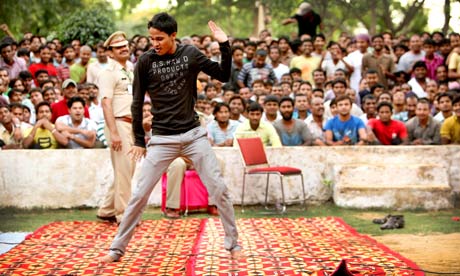
The concert was part of an effort to use music to rehabilitate prisoners. Photograph: Amit Bhargava/Corbis for the Guardian
It may not have been Johnny Cash playing Folsom prison but it was about as close as India could get: 1,000 or so prisoners, most serving long sentences for serious violent crimes, in the yard of Tihar, Delhi's high-security prison, with a stage, a sound system, a shiny pink-and-white marquee for dignitaries, soft drinks and biscuits.
Bollywood numbers belted out by the jail band, a hip-hop collective and the Indian capital's best-known (indeed only) ska outfit provided the entertainment. The concert, the first of its kind, was part of a new initiative by local prison authorities to use music to rehabilitate hardened prisoners.
"The only other thing we had was a concert of classical Bengali music. This is the first time we are trying something western," said Neeraj Kumar, the director general of Delhi's prisons and the man ultimately responsible for 12,000 prisoners.
Kumar explained he wanted music to be an essential part of the prison routine. Over the past year, music rooms equipped with instruments have been set up in all 10 of the city's jails. A Tihar talent competition has been launched. "We've seen an amazing difference," he said. "We had one inmate who was repeatedly suicidal. But the music changed all that. We could take him out of fetters. There are many such stories."
Though Indian prisons have a reputation for overcrowding and violence, many governors have introduced innovative measures to teach prisoners skills, occupy their days or to keep families together. The women's wing at Tihar has a creche and children under six can stay with their mothers in prison.
One prison in the southern Andhra Pradesh state recently announced plans to open its own call centre, hoping to prepare prisoners for jobs in the boom local industry. Penal experts in India say prisons across the country vary but are largely free of the systematic brutality practised during police interrogations, for example.
The prisoners' enthusiasm was evident from the moment the SlumGods – the hip-hop group formed of local artists and boys from Delhi's rundown, overcrowded Khirki neighbourhood and the famous Dharavi district in Mumbai – took to the stage.
"Hip-hop has a long history in India," said He Ra, who runs SlumGods and an NGO that introduces music to disadvantaged teenagers. "It goes back to when local versions of foreign films like Breakdance came out in the 1980s and became popular in the slums."
The youngest performer was Milan Rehman, 12, who had risked his parent's wrath to perform. "My mother told me not to go to Tihar," he said. "But why shouldn't I go? I told her it's a good opportunity."
For Avinash, a convict serving a 10-year sentence for murder, any music is a welcome break from the prison routine. "I like more Hollywood and Bollywood music but am very open-minded. I like to dance too. It is just a shame there are no ladies," he said.
Raja, convicted of rape four years ago, and Mohit, who is serving his fifth sentence for aggravated robbery, both said they welcomed anything that made time pass faster.
Prison guards were not expecting any trouble. Prisoners from the highest-security wing – mainly convicted terrorists – were led to the front and sat on the floor unshackled near a mural showing Buddha meditating and beneath a slogan reading: "It is better to light a candle than to curse the darkness".
A rap from the teenagers of SlumGods – "What am I worth when the police and the politicians have all the money" – got a cheer. If the band, whose name is a play on the title of the Oscar-winning film Slumdog Millionaire, met with a relatively muted reception, the crowd warmed up when the prison band, the Living Souls, ran through half a dozen classic Bollywood numbers.
First singly, then in pairs, and finally in groups, men broke out of the packed crowd to dance. By the time the Ska Vengers started their set, as the shadows began to lengthen and the white-uniformed servants ferrying tea to the "VIPs" began to tire, the robbers, murderers, rapists, terrorists and "under trials", who wait often for years for their cases to be heard, were in full cry.
Versions of hits from the streets of north London in the late 1970s were met with an enthusiastic, if slightly bemused response, but it was a series of dub and reggae classics and then a Hindi-language hippy-era psychedelic anthem Dum Maro Dum, ("toke, take a toke") that finally led to guards stepping in to usher frenzied dancers away from the stage.
Then, minutes after the last notes had died away, the prison yard was empty again.

No comments:
Post a Comment